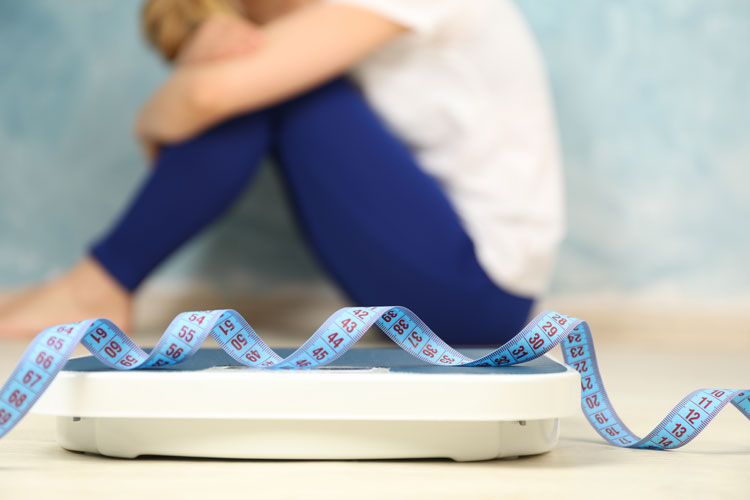THE COMPLEXITIES OF MENOPAUSAL WEIGHT GAIN
Many women report a gain in weight in midlife, but the reasons for this are multifactorial. Midlife tends to be accompanied by a muscle mass fall, resulting in a fall in resting metabolic rate and burning fewer calories.
There is a complex relationship between oestrogen and weight gain. The fall in oestrogen sees a change in our gut bacteria, thought to be involved in weight gain. Our bodies also turn to oestrogen produced by our fat cells, which is another reason our bodies tend to hang on to fat in midlife.
How can I avoid weight gain in menopause?
A diet high in protein and free from refined carbohydrates is essential in keeping blood sugar levels stable by stopping our bodies from converting glucose to fat. Building resistance exercises into our daily routine, and preventing muscle mass from dropping, keeps our metabolic rate up and weight down.
HRT (Hormone Replacement Therapy) can be the missing link for some women struggling to shift weight as replacing the oestrogen deficit can stop our bodies from hanging onto the oestrogen-producing fat cells, as well as giving many women the get-up and go to start exercising.
Sleep is an integral part of weight management as lack of sleep results in a rise in the hormone Ghrelin, which increases appetite and weight gain.
Conversely, when a person sleeps, the hormone Leptin rises, subduing the need to eat by reassuring the brain that energy reserves are adequate for the time. Cutting down screentime before bed, taking measures towards a calming sleep environment – ideally a cool, dark room, and going to bed at the same time each day, are essential to ensure enough sleep.

How does a woman in menopause lose weight?
To lose weight in menopause, increasing our metabolic rate by building lean muscle will help shift the weight. The fall in muscle mass is one of the key reasons women gain weight in midlife, as the fall in oestrogen and natural ageing leads to a reduction in muscle bulk. This can be reversed with resistance exercises 3 times a week. A slight increase in muscle mass can lead to a fall in body fat, as our bodies burn more calories.
A crucial part of losing weight in menopause is reducing stress. Our hormone cortisol spikes when we are stressed, and increases in cortisol can cause increases in blood sugar, then stored as fat, ultimately causing us to gain weight.
Stress also plays havoc with our sex hormones, oestrogen and progesterone, further amplifying this effect and causing the body to hang onto body fat.
Learning to slow down in midlife and relax while eating a balanced diet will help you lose weight. For many women, high-intensity exercises, eg. HIIT training and long-distance running, can be perceived by the body as ‘stress’ raising cortisol levels and preventing weight loss. Often when these women switch to recuperating exercises such as Yoga, or Pilates, they see a drop in their weight.
What is the best diet to lose weight during menopause?
Losing weight is more complex than calorie counting and more about eating the right foods. Our gut microbiome is involved in weight gain, and eating a predominantly plant-based diet, with diversity in colour of fruit and vegetables, will ensure a variety of gut bacteria that will promote a healthy weight.
Maintaining stable blood glucose will avoid the peaks in blood sugar which cause weight gain. Stable blood sugar can be achieved by eating protein during a meal, avoiding refined carbohydrates such as sugary snacks, and eating complex carbohydrates, including plants and wholegrain, with a slow release of energy. Our calorie requirements go down in midlife, and a shift to smaller portions, combined with an active lifestyle, is needed to lose weight.

Does HRT (Hormone Replacement Therapy) cause weight gain?
Studies suggest there is no established link between the use of HRT and weight gain. Women experiencing weight gain are likely caused by the other effects of menopause, not from taking HRT.
Often, women find that HRT helps them maintain a healthy weight more easily. Replacing oestrogen will often take away joint pains and increase muscle mass, allowing many to start exercising more and lose weight.
Are women more prone to becoming diabetic during menopause?
Women have a higher risk of developing diabetes after menopause. The fall in oestrogen can predispose women to metabolic syndrome – a cluster of conditions including abdominal obesity, high blood pressure, high blood sugar, high serum triglycerides, and low serum high-density lipoprotein (HDL).
Oestrogen directly impacts how our bodies respond to insulin, which is the hormone that brings down blood sugar by storing glucose. Insulin facilitates the transport of glucose into your body’s cells and signals to the liver to convert glucose into glycogen for storage. A fall in oestrogen can give rise to insulin resistance. Blood sugar levels can remain elevated, leading to diabetes.
Exercise is essential in reducing insulin resistance, as studies show that movement causes our muscles to become more insulin sensitive. Exercise is protective against diabetes in conjunction with a diet low in refined carbohydrates.

Final Thoughts
Weight gain in menopause is common, and it’s a combination of factors, including a loss of muscle mass, a change in calorie requirements and a shift in our gut bacteria that can cause this.
Taking measures to improve your diet, build resistance exercises into your routine, get more sleep and reduce stress will go a long way to preventing weight gain and losing excess weight. HRT can help many women increase their levels of exercise and build muscle to help maintain a healthy weight.
Book a Discovery Call



